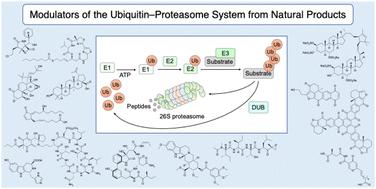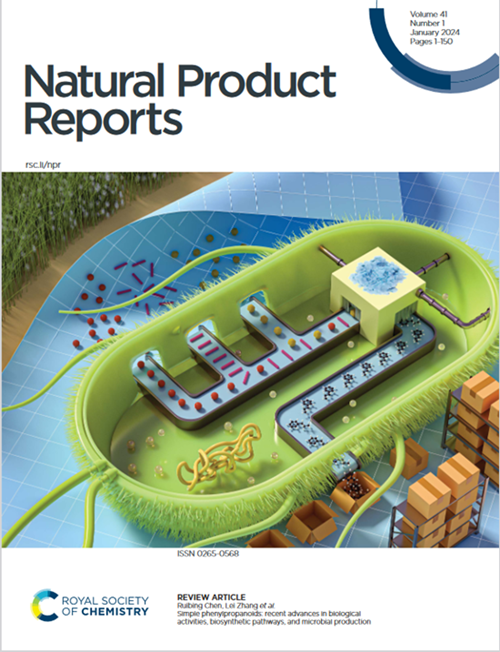天然产物中泛素-蛋白酶体系统的调节剂:化学结构及其药物发现的潜力。
IF 10.6
1区 化学
Q1 BIOCHEMISTRY & MOLECULAR BIOLOGY
引用次数: 0
摘要
泛素-蛋白酶体系统(ubiquitin-proteasome system, UPS)在调节细胞内蛋白降解和维持细胞稳态中起着关键作用。在UPS中,目标蛋白通过泛素化相关酶催化的序列反应被多泛素化。这些泛素化蛋白随后被26S蛋白酶体识别和降解。去泛素化酶切割形成的多泛素链并调节蛋白质降解,从而有助于系统的精确调节。UPS的失调与癌症、免疫紊乱和神经退行性疾病有关,使其成为药物发现的潜在靶点。迄今为止,各种针对UPS的天然产物已经被发现并用于药物开发,这些化合物为UPS调节的分子机制提供了重要的见解。本文综述了抑制UPS蛋白降解和激活20S蛋白酶体介导的蛋白降解的天然产物,从而阐明了它们的作用机制,并探索了它们作为治疗药物的潜在应用前景。本文章由计算机程序翻译,如有差异,请以英文原文为准。

Modulators of the ubiquitin–proteasome system from natural products: chemical structures and their potential for drug discovery
Covering: up to 2024
The ubiquitin–proteasome system (UPS) plays a key role in regulating intracellular protein degradation and maintaining cellular homeostasis. Within the UPS, target proteins are polyubiquitinated through sequential reactions catalyzed by ubiquitination-related enzymes. These ubiquitinated proteins are then recognized and degraded by the 26S proteasome. Deubiquitinating enzymes cleave the formed polyubiquitin chains and regulate protein degradation, thereby contributing to precise regulation of the system. Dysregulation of the UPS is associated with cancer, immune disorders, and neurodegenerative diseases, making it a potential target for drug discovery. To date, a variety of natural products that target the UPS have been discovered and used in pharmaceutical development, and these compounds have provided important insights into the molecular mechanisms of UPS regulation. This review describes natural products that inhibit protein degradation in the UPS and activate protein degradation mediated by the 20S proteasome, thus clarifying their mechanisms of action and exploring their potential applications as therapeutic agents.
求助全文
通过发布文献求助,成功后即可免费获取论文全文。
去求助
来源期刊

Natural Product Reports
化学-生化与分子生物学
CiteScore
21.20
自引率
3.40%
发文量
127
审稿时长
1.7 months
期刊介绍:
Natural Product Reports (NPR) serves as a pivotal critical review journal propelling advancements in all facets of natural products research, encompassing isolation, structural and stereochemical determination, biosynthesis, biological activity, and synthesis.
With a broad scope, NPR extends its influence into the wider bioinorganic, bioorganic, and chemical biology communities. Covering areas such as enzymology, nucleic acids, genetics, chemical ecology, carbohydrates, primary and secondary metabolism, and analytical techniques, the journal provides insightful articles focusing on key developments shaping the field, rather than offering exhaustive overviews of all results.
NPR encourages authors to infuse their perspectives on developments, trends, and future directions, fostering a dynamic exchange of ideas within the natural products research community.
 求助内容:
求助内容: 应助结果提醒方式:
应助结果提醒方式:


